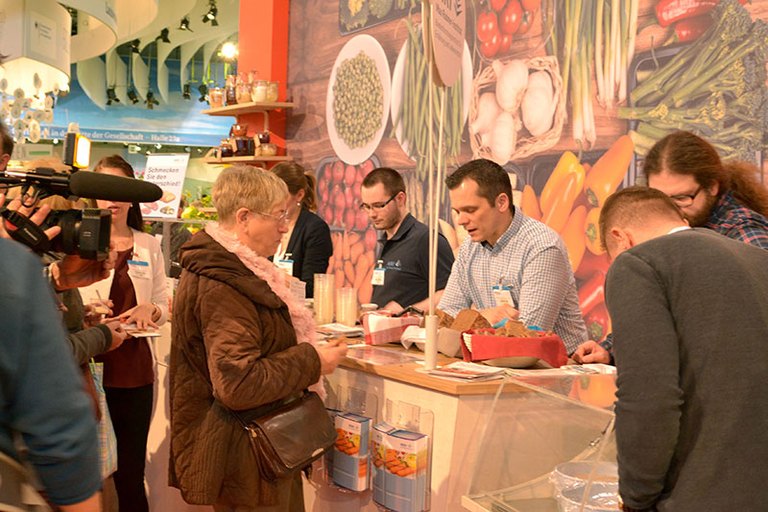Research for new recipes and production methods
Cold meat products, fish and bread, biscuits and chocolate – you can find them all at the Max Rubner-Institut’s stand during the 2019 International Green Week in Berlin. In the course of a taste test, visitors to the stand are invited to undertake the none-too-easy task of determining the differences in salt, fat and sugar content. Apart from tasters, you can get a wealth of information directly from the scientists and plenty of practical tips on how to reduce the amount of salt, sugar and fat in your diet.
Fat, salt and sugar are important ingredients in many foodstuffs. All of them crucially influence taste – and not just that: when it comes to the shelf-life of perishable food, salt is often essential. But too much salt, fat and sugar are bad for your health and may lead to so-called “diet-related diseases” such as obesity and cardiovascular diseases. The Max Rubner-Institut investigates ways of reducing these ingredients. On the basis of scientific studies, new recipes and production methods are developed – this is known, in a nutshell, as “reformulation”. How you can reduce salt, fat and sugar in foodstuffs and what research can do to help will be presented by the Max Rubner-Institut at the 2019 International Green Week during a BMEL special show in Hall 23a.
Reformulation at the Max Rubner-Institut
In the case of cured herrings and biscuits, scientists at the Max Rubner-Institut have already managed to reduce salt and fat content without affecting taste and shelf life. They can also guarantee that the reformulated products can be processed and comply with food safety standards. When reformulating cured herrings, the Max Rubner-Institut used potassium salt instead of the usual sodium chloride, which reduces the common salt content by half. For biscuits, the scientists chose a different strategy, focusing less on reducing fats and more on using better fats. To produce the so-called “oleogels”, valuable plant oils are hardened by including additives like sunflower wax without releasing the amounts of harmful saturated and trans fatty acids usually found in conventionally hardened oils and fats. The result is that you can still bake delicious biscuits without coconut fat, palm butter or animal fat – a plus for your health and the environment with no loss of aroma. Try for yourself!
Can you taste the difference?
By taking the sensory test you might manage to convince your taste buds that more fat, salt and sugar do not always also taste better. Can you decide which of the cold meat products contains less fat, which bread, less salt, or which chocolate, less sugar? And which do you prefer?
Your choice!
In the supermarket you yourself can decide how much fat, salt and sugar are contained in the food you buy there. All you have to do is compare the nutrition labels on the packaging. Test your knowledge at the IGW: Which contains more sugar – fruit muesli or fruit yogurt, gummi bears or chocolate-coated marshmallows? One thing is for sure: you will be in for some surprises!


